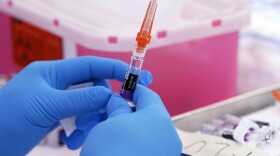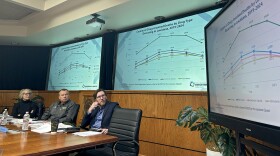A bill to ban the addition of fluoride to Louisiana’s public water systems has advanced to the state’s senate floor.
Senate Bill 2, sponsored by Republican Senators Mike Fesi, Patrick McMath, and Heather Cloud passed through the Health and Welfare committee by a 6-3 vote Wednesday night following a hearing that lasted just over an hour. The bill now heads to the Senate floor for debate.
Currently, Louisiana law requires the Louisiana Department of Health to establish a water fluoridation program for public water systems with at least 5,000 service connections — with some exceptions made for water systems that meet certain criteria. LDH is also responsible for establishing the levels of fluoride that public water systems must comply with.
If passed, SB 2 would repeal LDH’s water fluoridation program and prohibit the fluoridation of public water systems effective at the start of the new year.
In his opening remarks Fesi said that fluoridated drinking water causes thyroid problems and is a “hazardous waste.” He later made unfounded potential links between the levels of fluoride in drinking water and autism.
“I don’t understand why we’re putting such a poison into our water,” Fesi said. “So that’s why I want to remove it.”
Louisiana Surgeon General Ralph Abraham appeared alongside Fesi at the committee in support of the ban. Abraham said there are studies linking long-term intake of fluoride, even at commonly acceptable levels in drinking water, to lower IQs in children and the issue boils down to a “freedom of choice.”
“Putting a chemical in the water without the patient's consent is problematic for me as a physician,” Abraham said.
The push to ban fluoride is part of a larger, national political agenda. At an April 21, 2025 press conference, Abraham said the bill is a “work in progress” and referenced Health and Human Services Secretary Robert F. Kennedy Jr.’s calling for the Centers for Disease Control and Prevention to review the long-established data on water fluoridation, saying it was “a good thing.”
Kennedy, who previously sold highly-fluoridated bottled water, has recently made false claims about fluoride, linking it to health problems and calling it a “dangerous neurotoxin.”
The bill is strongly opposed by health experts and dentists, who argue that banning fluoride could have wide-ranging health impacts, especially for low-income communities with limited access to dental care.
Fluoride is a naturally-occurring mineral that has been added to public water to help prevent tooth decay since the 1940s. It protects teeth by strengthening the tooth’s hard outer surface, making it more resistant to acidity in the mouth — commonly brought on by consuming sweet tea, popular sodas, wine, coffee and other acidic drinks and food. Community water fluoridation has been held up as “one of the greatest public health achievements of the 20th Century” by the CDC.
“I almost think of it as trying to patch up a wall with concrete instead of trying to patch up the wall with just paint. The concrete obviously is much stronger,” said Dr. Jeffrey Kerst, director of the Louisiana Dental Association and a practicing dentist in Shreveport. “Fluoride is the exact same thing, it just creates a much stronger bond to protect the teeth whenever you do have acid into your mouth.”
Kerst said removing fluoride would be “one of the biggest mistakes that the leadership of our state could make.” He said studies linking fluoride to lowering children’s IQ, thyroid issues and other negative health impacts are all related to high doses of fluoride — with levels of at least 1.5 parts per million. The standard for community water fluoridation in Louisiana and across the country is 0.7 parts per million.
“The dose makes the poison,” Kerst said. “We don’t fluoridate at even half of that level. [It’s] the same way that if I gave you too much salt, the same if you drink too much water, it could also be considered to be bad for you.”
At a recent meeting of the Louisiana Dental Association, Kerst said the dentists unanimously opposed banning fluoride.
“Unfortunately, it's about politics and not about children and the people who need the fluoride the most,” Annette Droddy, the association’s executive director, said.
So far, only Utah has banned fluoride in public water. Droddy pointed to other states like Montana, North Dakota and Tennessee that have voted down fluoridation prohibition proposals.
“It’s not unreasonable to think that Louisaiana legislators would do the same thing,” Droddy said. “We don't have to follow the national trend, and we don't have to do this to the underserved population.”
Proponents have argued that the bill would give people the ability to choose whether or not they want to drink more fluoride than what naturally occurs, just as Abraham alluded to during the committee meeting. But Droddy said they’re thinking of choice in the “wrong direction.”
“I can drink bottled water. I can buy non-fluoridated toothpaste. I can ask the dentist to not put fluoride varnish on my teeth when I go to the dentist. There's all kinds of things that I can choose to do if I don't want fluoride,” Droddy said. “But you have no choice if there's a ban.”
Dental experts say concerns about lowering IQ and other negative health impacts are the latest claims made against fluoridated public water, which has been the subject of controversy and conspiracy theories since its inception.
The “Red Scare” saw far-right political activists in the U.S. claim that water fluoridation was a component of a larger plot to establish a communist or socialist government in the late 1940s and throughout the 1950s.
Dr. Scott Tomar, Associate Dean for Prevention and Public Health Sciences at the University of Chicago Illinois College of Dentistry, noted that politicians in the past have tried to blame fluoridation as cause for a number of medical conditions, including Down syndrome, osteosarcoma and other cancers, and an increased risk of HIV and AIDS infections.
“The disease of the month has changed over the course of my career,” Tomar said.
The latest attacks are driven by a mistrust of public health and healthcare, fueled by misinformation from leaders like Kennedy, Tomar said.
“While I support some of his goals of addressing chronic diseases through things like better nutrition and food labeling,” Tomar said. “It's a mystery to me why he would go after things where we have such consistent evidence of safety and effectiveness — things like vaccination and community water fluoridation.”
This story was produced by the Gulf States Newsroom, a collaboration between Mississippi Public Broadcasting, WBHM in Alabama, WWNO and WRKF in Louisiana and NPR. Support for public health coverage comes from The Commonwealth Fund.












